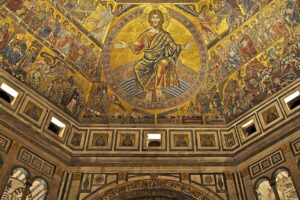Fr Neil’s homily for Advent Sunday, 28 November 2021
Now when these things begin to take place, look up and raise your heads, because your redemption is drawing near.¹
Happy New Year! The new liturgical year begins today with the celebration of Advent. Our readings at Mass on Sundays will now follow Year C in our three year cycle and our weekday readings Cycle 2. In the Ordinariate Daily Office, we use Year II for Sunday readings from today.
Advent carries with it a reorientation of time and a deliberate tension between end of time fulfilment and promise, expectation and deliverance, between looking forward and looking back.
Jeremiah reminds his audience that God has promised that he would send a deliverer, who was from the root and stock of David, the great king. He speaks these words of consolation to God’s people at a time of their great desolation and exile. He is reminding them that they can look beyond the terror they are experiencing to the promised deliverance through God’s messiah.
We are able to look back and see that it was a thousand years from King David to the fulfilment of that promise in the birth of the Christ-child. Like all God’s promises that speak of a messiah and deliverer, we can bear witness to their fulfilment. God’s word can and is to be trusted.
It is in the celebration of these past glorious events of God’s saving work that we can stand today in the promise of the eventual renewal of all creation. Christ will come again to complete the promises of God to his people.
St Paul, writing to the Thessalonians, reminds them they are to prepare for that Day. They wait in the light of the promises of God, as children of the kingdom. That preparation is not in the first instance to dig bunkers, lock themselves away and to stop all normal activities. His advice on how to make ready for that Day is to grow in “love for one another and all men,” “So that he may establish your hearts unblameable in holiness before our God and Father, at the coming of our Lord Jesus with all the saints.”²
This Advent is an opportunity to ask ourselves as individuals and as a community what changes might we need to make so that we can love one another and the Lord in a more real, a deeper, way?
It is in this transformation of our souls, united to the Sacred Heart of our Lord, to the Immaculate Heart of Our Lady, in the power of the Holy Spirit, that enables us to know the merciful love of God. We cannot be unchanged by such an encounter. We must look back to our ancestors in the faith who have walked this path before us as examples of a life devoted to Christ.
On Sundays and solemnities we state our faith by reciting the Creed. For Advent there is particular resonance in the lines “and was incarnate by the Holy Ghost of the Virgin Mary, and was made man” And “and he shall come again, with glory, to judge both the quick and the dead; whose kingdom shall have no end.” These lines enable us to look back and direct our gaze forward.
Our creeds are propositional statements of faith — this is what we believe. Intellectually and philosophically we can work through these statements and give our own assent. Vitally important though this is, it is only one form of knowing. Another form of knowing is experiential. It is immersive experience that opens the heart and soul and which encounters the Spirit of the living God. It is something outside of ourselves — yet is encountered within the heart.
It is no coincidence that the two areas of the Church in the West that are experiencing growth, especially with the young, are the old Latin Rite and the Charismatic Movement. These may seem diametrically opposed to each other, but what they share in common is that they both offer an experience of the ‘other’ that goes beyond the mere propositional. The Old Rite gives us the sense of the numinous, the heavenly realities that allow a glimpse of the glory that lies beyond ourselves. This invites us to enter. It has the language and characteristics of beauty and we abandon that sense of beauty in our liturgical life at our peril. The Charismatic Movement offers a deeply personal experience of Christ in the Spirit and supernatural gifts of the kingdom. Both need the propositional means of knowing, and the interplay between the two is a means of articulating what is experienced and providing boundaries beyond which we cannot go, guarding us against falling into error.
It is surely this double sense of knowing the Lord that allows us to heed the words of Christ and not to be “weighed down with dissipation and drunkenness and cares of this life, that that day come upon you suddenly”³.
To live and see beyond the troubles and trials of this present life requires a vision of the promise that is to come. It is in knowing the Lord and experiencing his presence, praying with the word of God in the beauty of our sacramental liturgy, and searching to engage with the teachings of the Church, that will enable us to stand in our present times with living faith. The Church at the moment may be ridiculed, rejected⁴, seen as irrelevant and even spoken of as being evil. Yet we can trust that God’s word is eternal and the present simply a passing moment, and we can look forward to the coming promise with heads held high in the knowledge that our redemption is drawing near.
Come, Lord Jesus, come!
¹ Luke 21:28
² 1 Thessalonians 3:12–13
³ Luke 21:34
⁴ Cf Isaiah 53:3








 Posts
Posts